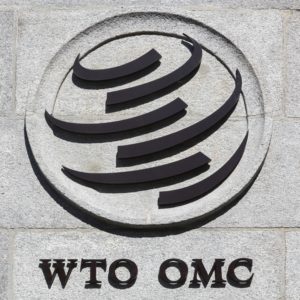As the U.S.-China trade war creates uncertainty and buffets the stock market, there’s at least one bit of economic stability to be thankful for this holiday season. Members of the World Trade Organization have voted not to begin imposing customs duties on digital products such as software, e-books and streaming video services.
A WTO moratorium has shielded cross-border digital trade from tariffs for the past 21 years. Renewable every few years, it was set to expire at the end of December.
As the volume of digital trade has grown, some WTO members have begun to worry that the moratorium is costing them tax revenue. This fear is especially acute among developing countries.
But digital tariffs would likely shrink GDP growth, thereby eroding tax revenue. One study estimates that the moratorium prevents about $2 billion in tax erosion among member countries. Meanwhile, an OECD report released in November says the moratorium could reduce global trading costs by up to $8.1 billion.
If digital tariffs were put in place, the cost of enforcing them far outweigh any benefits, since tracking and taxing electronic transmissions would be complex. As the head of the International Chamber of Commerce recently pointed out, consumers who watch a movie on their smartphones could receive up to five million data packets originating in nine separate tax jurisdictions. Calculating and collecting the appropriate tariffs on even a single film would be a major challenge — not to mention the headache of tracking the countless digital transmissions sent by businesses and consumers each day.
Moreover, enforcement costs would disproportionately hurt small businesses, especially those in developing countries. This would inhibit innovation and put technology even further beyond the reach of the “digital poor.”
One of the WTO’s guiding principles is that countries should prevent the trading environment from becoming overly complex. Although the moratorium supports that goal, it has not yet become permanent. For that reason, several WTO member states have signed nine regional trade agreements and 13 bilateral ones that create a permanent moratorium — a tactic that protects them from other countries that might eventually decide to begin taxing digital goods. If the global moratorium were to lapse, these regional agreements would remain in effect, greatly complicating digital trade and creating market-distorting incentives to re-route data through duty-free jurisdictions.
The OECD notes that tariffs are generally associated with lower productivity and that their burden falls disproportionately on domestic households rather than foreign enterprises. There are better ways to raise revenue on intangible goods, including Value Added Taxes and Goods and Services tax systems. VAT and GST do not preferentially discriminate against smaller companies or developing countries, and they are simpler and cheaper to implement and comply with.
The moratorium banning tariffs on digital products will be up for a vote again next June at the 2020 WTO Ministerial Conference. To keep trade open and fair, WTO members should consider making it permanent.
An evidence-based study would inform the debate on whether cross-border electronic transmissions help or hurt developing countries and the digital economy, and whether a permanent injunction against levying tariffs on digital products and services would be a boon for the international trading system. Member states should fast-track such a study so it is ready for review well in advance of the next Ministerial Conference in June 2020.
The moratorium’s extension is a welcome dose of good news in a troubled trading environment. Maintaining it over the long-term would give member states the confidence to keep developing innovative digital trade. It would also demonstrate how to create future shared prosperity using a rules-based multilateral framework that safeguards openness, fair competition, and innovation.

